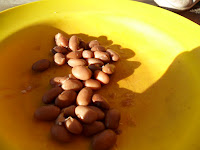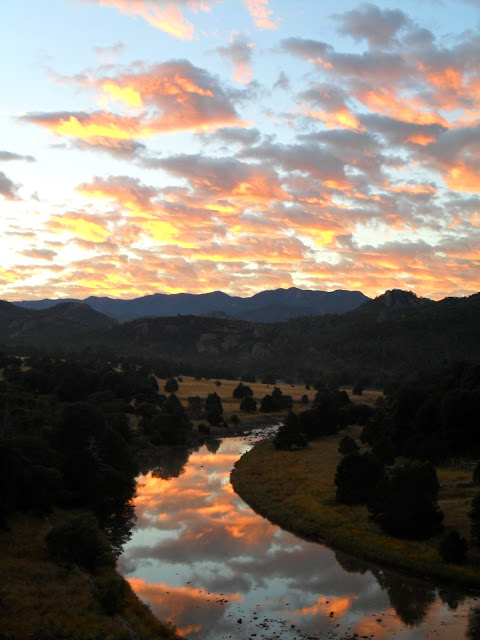"Somewhere along the line I knew there'd be girls, visions, everything; somewhere along the line the pearl would be handed to me." Jack Kerouac, On The Road
 |

The first stars came out over the massive ramparts of the canyons, now high above and wheeling slowly around, the clatter of the engine battering the granite facade. In Temoris the tropical plants began, and we whooshed by prehistoric leaves hanging idle in the moist dark. On the train was a group of Romanians in their twenties, smoking in the corridors in their striped hoodies, snapping photos and swinging their hips to the music of their ipods. Soon it was just me and one other, with firm arms and blazing lips, and she turned on me and locked me in such a look that I was bowled across the pass-way and found myself with my head outside the train gulping breaths of rushing air and staring at the moon, full and beaming down in the barranca dark.
We came down into El Fuerte, spread green on the flat apron of the sierra, thick with palms and strange twisting trees with the girth of bridge pylons. I piled into a truck with the Romanians, fully aware of her, the one with a sledge-hammer gaze. We glided into town, the buildings all white and the trees swathed in lime to keep out burrowing menaces. And then we were in the plaza, beside the luminescent gazebo. I fanned out with a different Romanian in search of shelter and accepted the first place we found sight unseen, although the Romanian continued on and I soon found out why. The room was a cube of concrete with a few dirty sheets on the bed and a pipe protruding from the wall where supposedly water comes. I sat on the bed deflated.
I went outside and slunk across the plaza, sucked dry by the day's dizzying motion and my sheer distance from the familiar tread of the my bare feet on our living room rug, from the sound that the scrub oaks leaves make as they rustle and fall in October. Across the way, the Romanians sauntered. I shrunk and hid from myself inside. Then I went back to my cell to sleep a swirling, greywater sleep.
In the morning the town was transformed, colors bouncing from the bougainvilleas, kids shouting and jumping outside the schools. I leered at them as I passed. They laughed. Soon fifty of them were pressed aginst the fence, laughing at the leering gringo. Even the nunnish teacher cracked a smile. I had an urge to join the circus.
I walked along the El Fuerte river which roils through town with a slow dilluvian force carrying the sediment of the gashes of the Barrancas down to the fertile flats the feed the many mouths of wintertime America. Herons and grebes hunch and gabble on snags and start up through the morning steam. The river languors under the old wall of the Spanish fortress.
My insides were jumping to go, and soon I was jouncing along amidst a racket of grinding gears and Banda music on the highway to Los Mochis. From there I mounted on high the cool rectangle of a Sonora Norte bus, making time through the dark landscape of thorn-scrub which slipped by remote behind the tinted glass.
I landed for the night in Mazatlan, eager to witness the great pulsing life of a famed Mexican resort town, but found a great wasteland of a city, with soulless seafood restaurants and fat-legged American tourists the color of raw pork and beaches fronted with salmon colored hotels. I got up and out early. That night I landed, bewildered and beat in the buzzing plaza of San Blas, Nayarit. Every night the whole town comes out to the plaza to talk and smoke, and the surf bums come and go on their fixed-gear bikes.
Right off I met a bum from Xalpapa named Itzvan. Itzvan talks as if each phrase he utters is some great new idea that we have discovered together. He is skin and bones with flip flops and a great shaggy beard. He went around the plaza selling the paper flowers he makes, presenting each as a french waiter might present the hours de' ouvoures. I watched Itvanz' stuff while he made sales and the village idiot came up and started yakking in my ear.
"This is my special medicine" he yelled, swirling some yellow-brown liquid in a coke bottle in front of my face. " By God this is my Medicine." Then he suddenly started and turned with a paranoid look to survey his surroundings.
"Watch yourself," he murmured to me, low. "Watch out because they'll steal it. Bad people here. Watch yourself." He did another slow undercover detective scan of the plaza. He held my hand. He insisted I come stay at his place.
Itzvan came back and we took off, insisting to the idiot that we would see him in the plaza the next day so that he wouldn't burst into tears. In the end he was happy and shouted something about his medicine to us. We found Stoners Surf Camp, a place to camp on the beach. At midnight we sat on the dark beach and were stung to distraction by hordes of gnats, the evil messengers of Mammon, and ate onions, avocado, bananas, cheese, and apples all wrapped up in tortillas.
"I call it the vegetarian burrito" Itzvan announced, as if he had just made a startling culinary breakthrough. We smoked a cigarette. He told me about the Mayan way and about how the only pure life is the one of travel, of leaving everything behind and carrying your living on your back, learning far and wide from the people. He told of how he learned a fail-safe remedy to avoid sickness from a wizened old Indian women in Oaxaca, which is to drink a bottle of your own piss every morning. I guess we all have our special medicine.
We walked down the beach leaving footprints in the wet sand that were gone the next day.
I fished with Itzvan using his special set up that he learned from a wise man in Acapulco. I hauled in pargo and catfish using shrimp from a bag full of ice, while Itzvan caught nothing. We strung the fish live through their gills, tied them, and put them in the sea to keep them fresh, and then I went for fruit so we could cook them over hot coals. When I came back Itzvan was walking toward me.
"I went for cigarettes and someone cut the line."
I was dismayed but he was untouched and went off the smoke a joint with a dread-locked kid on a skateboard.
 |
| Hitchhiking to another beach, Noe Tablas to the left. |
 | |
| Boating to a beach with fisherman who kept yelling "TODO LA VIDA!" and whose skiff had a crack in it that let in a spurt of water every time we slapped over a swell. |
The great guru king of Stoners was Pompis. Pompis barely talked to anyone, and barely even moved, and if it weren't for photos hung up under the palapa of him streaking straight across the glassy face of a twenty foot swell, I might have thought him a dimwit. But everyone spoke of him with the a holy hush, a reverent awe. Noe proudly confided in me that he was one of the only outsiders that had been to Pompis house, and that Pompis had told him that the choice was his now, as if Noe now had a pivotal decision to make: would he give away all his belongings to the poor and follow this mystic figure shrouded in weed smoke?
Pompis had a daughter and while we were there he threw a quinceñeros at Stoners and everyone camped there partook in the feast. There were slabs of Mahi-Mahi 4 feet long and straight off the grill, slathered in lime and garlic. We flaked off great hunks of fish with our fingers. There were vats of savichi which we ate piled high on dorados. We quenched the spice of the savichi with agua loco, a sweet cinnamon and rice drink spiked with tequila. Pompis presided darkly in the background.
After a week my belly was full of fish and my arms sore from paddling my board I again felt the urge to go southward. After a wordless exchange of money with Pompis at 6 AM, I again found myself in the whirring air conditioned box of a bus, ascending the rise to Jalisco, and the blazing green cane fields around Tepic changed to the muted blue green of agave, with sheaves fanning sharp and pointed like the headdresses of old pagan gods buried upright up to the brow. The bus slid into Guadalajara where I changed to a different magical conveyance and sailed southward to the small town of Tonaya, Jalisco, where before my foot even touched the ground Israel Robles stepped forward to great me with his blazing smile.














